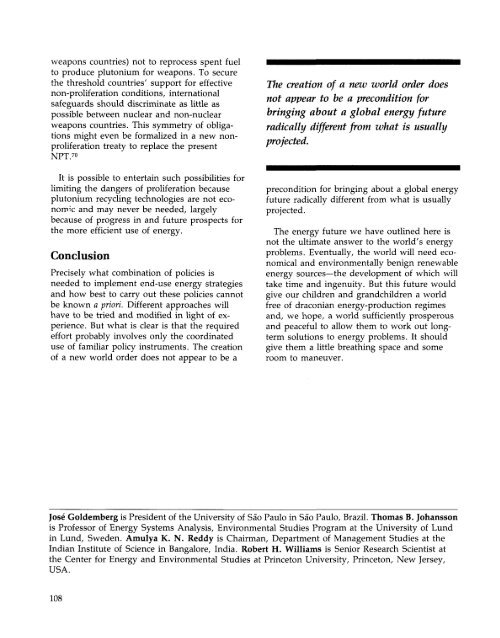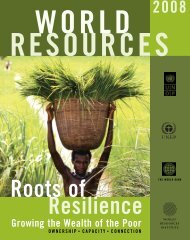ENERGY FOR A SUSTAINABLE WORLD - World Resources Institute
ENERGY FOR A SUSTAINABLE WORLD - World Resources Institute
ENERGY FOR A SUSTAINABLE WORLD - World Resources Institute
Create successful ePaper yourself
Turn your PDF publications into a flip-book with our unique Google optimized e-Paper software.
weapons countries) not to reprocess spent fuel<br />
to produce plutonium for weapons. To secure<br />
the threshold countries' support for effective<br />
non-proliferation conditions, international<br />
safeguards should discriminate as little as<br />
possible between nuclear and non-nuclear<br />
weapons countries. This symmetry of obligations<br />
might even be formalized in a new nonproliferation<br />
treaty to replace the present<br />
NPT70<br />
It is possible to entertain such possibilities for<br />
limiting the dangers of proliferation because<br />
plutonium recycling technologies are not economic<br />
and may never be needed, largely<br />
because of progress in and future prospects for<br />
the more efficient use of energy.<br />
Conclusion<br />
Precisely what combination of policies is<br />
needed to implement end-use energy strategies<br />
and how best to carry out these policies cannot<br />
be known a priori. Different approaches will<br />
have to be tried and modified in light of experience.<br />
But what is clear is that the required<br />
effort probably involves only the coordinated<br />
use of familiar policy instruments. The creation<br />
of a new world order does not appear to be a<br />
The creation of a new world order does<br />
not appear to be a precondition for<br />
bringing about a global energy future<br />
radically different from what is usually<br />
projected.<br />
precondition for bringing about a global energy<br />
future radically different from what is usually<br />
projected.<br />
The energy future we have outlined here is<br />
not the ultimate answer to the world's energy<br />
problems. Eventually, the world will need economical<br />
and environmentally benign renewable<br />
energy sources—the development of which will<br />
take time and ingenuity. But this future would<br />
give our children and grandchildren a world<br />
free of draconian energy-production regimes<br />
and, we hope, a world sufficiently prosperous<br />
and peaceful to allow them to work out longterm<br />
solutions to energy problems. It should<br />
give them a little breathing space and some<br />
room to maneuver.<br />
Jose Goldemberg is President of the University of Sao Paulo in Sao Paulo, Brazil. Thomas B. Johansson<br />
is Professor of Energy Systems Analysis, Environmental Studies Program at the University of Lund<br />
in Lund, Sweden. Amulya K. N. Reddy is Chairman, Department of Management Studies at the<br />
Indian <strong>Institute</strong> of Science in Bangalore, India. Robert H. Williams is Senior Research Scientist at<br />
the Center for Energy and Environmental Studies at Princeton University, Princeton, New Jersey,<br />
USA.<br />
108

















